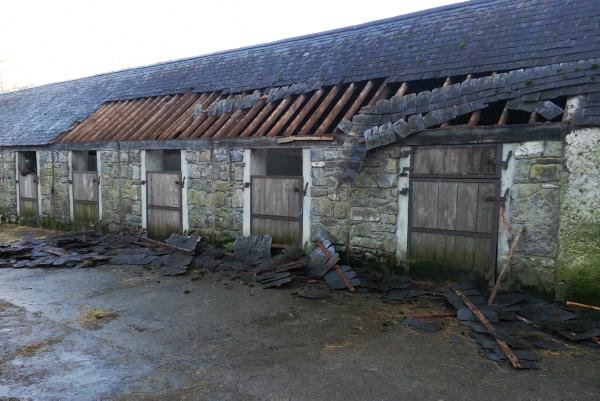Most of the main sheds stood up well to the challenge as we have good shelter belts of trees planted around the yard and the house, but these trees took a lot of punishment and around 50 trees have either fallen or partially toppled over across the farm.
Two old buildings on the yard with slate roofs had big areas of slates blown off and these will have to be repaired over the next few weeks. Thankfully nobody was hurt and no animals were injured.
The sheds were insured for storm damage so we will get a quote to repair the roofs and, hopefully, the insurance will cover most of the cost.
As usual, at times like this there’s plenty of stories going around about unfortunate people with lapsed premiums and inadequate cover.
We’ve stuck with FBD over the years for farm insurance and it was a huge relief to hear that we had a good level of cover on these two buildings.
Obviously, there will be a bit of horse trading to be done before we settle with them, but at least they will be bearing the brunt of the repair cost.
We lost power for 24 hours after the storm, so the cows were restricted to milking once a day for two days.
Some people were a lot worse off, with power cuts lasting five or six days in some cases. Milking is only one problem with a power cut.
We had freshly calved cows indoors on a dry diet with no water, we had 40 calves on an automatic calf feeder with no power to run it.
The slurry scrapers stopped, there were no lights or camera in the calving box and no telly or computers inside to entertain the kids. It’s lucky the tractor still runs on diesel or we would have been in even bigger trouble.
Generator
We hired a generator the morning after the storm to get things going again, but in typical Irish fashion the power came back five minutes after we got it hooked up and running. It quickly went to a friend’s farm that needed it more.
The County Council and ESB staff put in some serious work around here to get the country moving again. A short week later and everything is almost back to normal.
There’s a lot of work to do over the next few weeks to clear all of the fallen timber and lift the electric fences. The ground is too soft in some areas to get in with machinery. It’s all extra work to add to a busy spring workload.
Luckily, we have a student from UCD here for most of February. Having an extra pair of hands on the farm takes some of the pressure off.
Sean is from a beef, sheep and tillage farm, but is getting to know his way around a milking parlour fairly well after his first week.
Calving is going well despite all of the interruptions. We have over 60% calved at this stage with 59 heifers and 41 bulls out of the first 100 live calves.
Hopefully, this trend will continue for the next few weeks. We had the cows out grazing for a few hours over the last fortnight without doing much damage, but they’ve spent a lot more time in the shed than the field again.
We will try to graze the driest field on the farm this week.






 This is a subscriber-only article
This is a subscriber-only article







SHARING OPTIONS: